
Top Morning Routines After Waking Up to Boost Your
Energy and Beat Sleep Disorders
Starting your day with the right morning routine can make a big difference in your energy and mood. Additionally, from morning stretches to a healthy breakfast, small habits can help you feel great all day. Discover the best tips and exercises to boost your energy and start your day right.
Morning Routines for People with Sleep Disorders

1. Insomnia
Insomnia is a common problem [¹] where people have trouble sleeping. Additionally, it can happen alone or with other health or mental issues. Headache after waking up is also a common symptom associated with insomnia.
- Routine: Light morning exercise and exposure to natural light
- Benefit of Morning Routine: Additionally, helps regulate the sleep-wake cycle and improves mood and alertness
- Sleep Hygiene Practices: Moreover, maintain a consistent wake-up time and avoid caffeine later in the day.
2. Sleep Apnea
- Routine: Breathing exercises and a healthy breakfast
- Benefit of Morning Routine: Additionally, breathing exercises can strengthen the respiratory system; a healthy breakfast provides sustained energy
- Promote Restful Sleep: Moreover, use CPAP therapy as recommended and sleep on your side to reduce symptoms, which can also help prevent or alleviate headache after waking up.
3. Narcolepsy
Moreover, people with narcolepsy [²] feel extremely sleepy during the day, which also can have serious effects on their lives.
- Routine: Consistent wake-up time and light stretching
- Benefit of Morning Routine: Additionally, establishes a regular sleep-wake pattern and helps reduce sleep attacks
- Good Sleep Hygiene Habits: Moreover, take scheduled naps and avoid alcohol and nicotine
4. Restless Legs Syndrome (RLS)
Moreover, a common condition where you feel a strong urge to move your legs [³]. Moreover, this feeling usually happens when you're resting or sitting still, especially also in the evening or night, and gets better when you move.
- Routine: Morning leg stretches and gentle yoga
- Benefit of Morning Routine: Additionally, relieves discomfort in the legs and reduces symptoms
- Promote Restful Sleep: Moreover, take a warm bath before bed and use relaxation techniques
5. Circadian Rhythm Sleep Disorders
Circadian rhythm sleep disorders [⁴] occur when there is a misalignment between an individual's internal body clock and the external 24-hour environment.
- Routine: Exposure to natural light and morning exercise
- Benefit of Morning Routine: Additionally, helps reset the body’s internal clock and promotes better sleep patterns
Quality Sleep: Moreover, maintain a regular sleep schedule and limit exposure to blue light in the evening to help prevent or alleviate headache after waking up.
6. Parasomnias
Moreover, parasomnias are sleep disorders [⁵] causing unwanted physical events or experiences during sleep, such as sleepwalking, sleep terrors, sleep talking, and sleep paralysis.
- Routine: Calm, structured start to the day with relaxation techniques
- Benefit of Morning Routine: Additionally, reduces stress and anxiety, helping prevent nighttime disturbances
- Sleep Hygiene Practices: Moreover, create a safe sleep environment and avoid stress before bedtime.
7. Hypersomnia
Hypersomnia is a condition [⁶] where individuals experience excessive daytime sleepiness or prolonged sleep, affecting 4% to 6% of the population.
- Routine: Morning light therapy and moderate physical activity
- Benefit of Morning Routine: Additionally, helps also combat excessive sleepiness and promotes wakefulness
- Promote Restful Sleep: Moreover, maintain a regular sleep schedule and avoid heavy meals before bed
8. REM Sleep Behavior Disorder
REM sleep behavior disorder (RBD) [⁷] is a condition where people move and act out their dreams because their muscles aren't paralyzed during REM sleep, unlike normal REM sleep where the body stays still. Additionally, this can lead to vigorous or violent actions during sleep.
- Routine: Morning mindfulness and stress-relief practices
- Benefit of Morning Routine: Additionally, reduces stress, which can also help manage symptoms and improve sleep quality
- Good Sleep Hygiene Habits: Moreover, ensure a safe sleep environment and avoid alcohol
9. Sleep Paralysis
Moreover, sleep paralysis [⁸] is when a person cannot move, speak, or open their eyes for a brief period upon waking or falling asleep, but they are fully aware of it. Moreover, it often includes scary hallucinations and ends suddenly, either on its own or when someone touches or talks to them.
- Routine: Stress management techniques and a consistent sleep schedule
- Benefit of Morning Routine: Additionally, reduces occurrences of sleep paralysis and improves overall sleep quality
- Good Sleep Hygiene Habits: Moreover, ensure a relaxing pre-sleep routine and sleep on your side
10. Nightmares
Nightmares are distressing dreams [⁹] that can cause significant anxiety and fear, and are often associated with mental disorders such as PTSD, depression, anxiety, and more. Moreover, they can negatively impact mental health, sleep quality, and increase the risk of suicide.
- Routine: Relaxation exercises and a positive start to the day
- Benefit of Morning Routine: Additionally, reduces anxiety and helps also set a positive tone for the day
- Promote Restful Sleep: Maintain a stress-free bedtime routine and avoid scary media before bed
11. Sleep Talking (Somniloquy)
Moreover, sleep talking [¹⁰]is when someone talks during sleep without knowing it. Additionally, it also cause poor sleep quality and might be related to how the brain processes language and memory during sleep.
- Routine: Establish a calm morning routine with mindfulness practices
- Benefit of Morning Routine: Additionally, reduces stress and anxiety, which can also decrease the frequency of sleep talking
- Quality Sleep: Moreover, keep a consistent sleep schedule and create a peaceful sleep environment
12. Managing Sleep Inertia [¹¹]
- Symptoms: A state of grogginess and reduced performance during the transition from sleep to wakefulness.
- Routine: Additionally, gradual wake-up process and exposure to natural light
- Promote Restful Sleep: Moreover, ensure adequate deep sleep and also maintain a regular sleep cycle
Importance of Morning Routine

Moreover, here are some importance of a morning routine after waking up:
- Establishing a morning routine helps set a positive tone for the day, increasing productivity and focus.
- Additionally, consistent routines can also reduce stress and anxiety, providing a sense of control and stability, which may help prevent or alleviate a headache after waking up.
- Incorporating exercise and healthy eating into a morning routine promotes physical well-being.
- Moreover, a regular morning routine can also improve sleep patterns by reinforcing the body’s natural circadian rhythm, potentially decreasing instances of a headache after waking up caused by poor sleep.
- Engaging in activities like stretching, hydration, and healthy eating can boost energy levels for the rest of the day.
- Moreover, morning routines provide an opportunity to establish and maintain healthy habits, such as meditation, reading, or journaling.
- A structured morning routine helps manage time effectively, reducing the likelihood of rushing and being late.
- Additionally, starting the day with positive activities and intentions can enhance mood and overall outlook.
- Consistency in a morning routine fosters self-discipline and also commitment to personal goals.
- Moreover, a well-rounded morning routine contributes to a balanced lifestyle, promoting overall well-being and life satisfaction, even for those who experience a headache after waking up.
Morning Exercise Routines
Morning exercise is a great way to start your day with energy and positivity. Moreover, here are some benefits and examples of effective morning exercises:
Blood pressure [¹²] increases significantly right after waking up. Additionally, morning exercise helps lower blood sugar by increasing insulin sensitivity and promoting glucose uptake by muscles. Moreover, physical activity enhances the body's ability to use insulin effectively, which reduces blood sugar levels.
Furthermore, regular morning workouts can be a powerful tool in managing and also preventing high blood sugar and diabetes, as well as reducing the occurrence of headache after waking up by improving overall health and reducing stress.
1. Stretching
Simple stretches to wake up your muscles and improve flexibility.
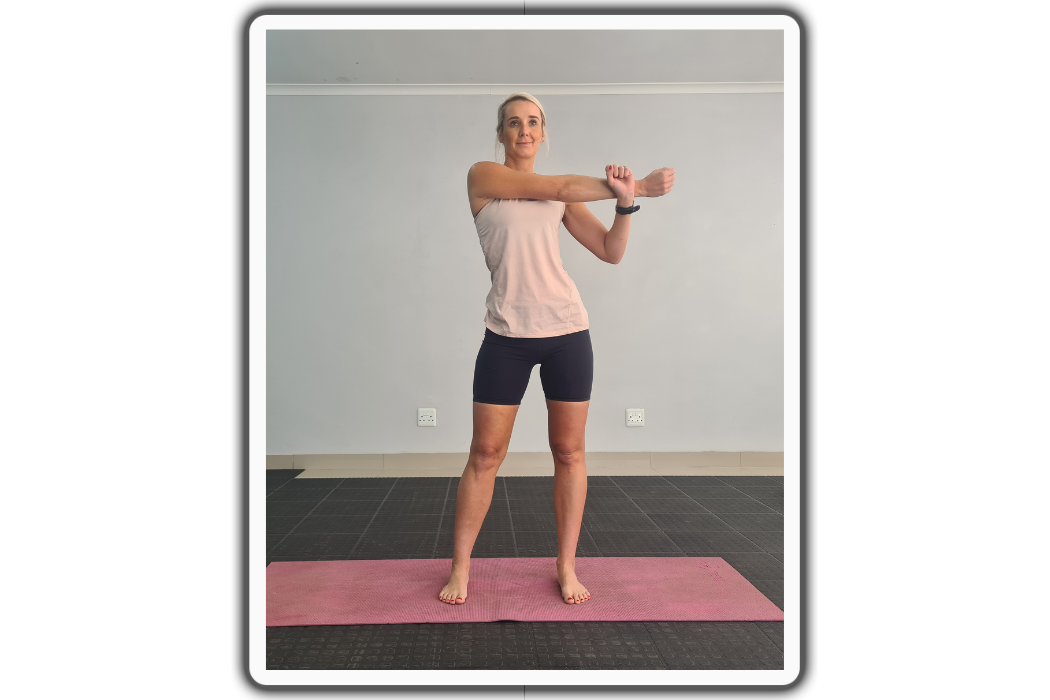
Cross-body Shoulder Stretch
- Begin in an upright standing position with your feet shoulder-width apart, maintaining good alignment with your head, shoulders, hips, and legs. Contract your core.
- Then, reach across your chest with one arm and use your other hand to pull your arm closer to your body, looking for a light stretch.
- Additionally, hold this position for several deep belly breaths, in through your nose and out through your mouth.
- Moreover, relax and repeat the movement on the opposite side.
2. Yoga
A gentle way to start the day, combining stretches with mindfulness.
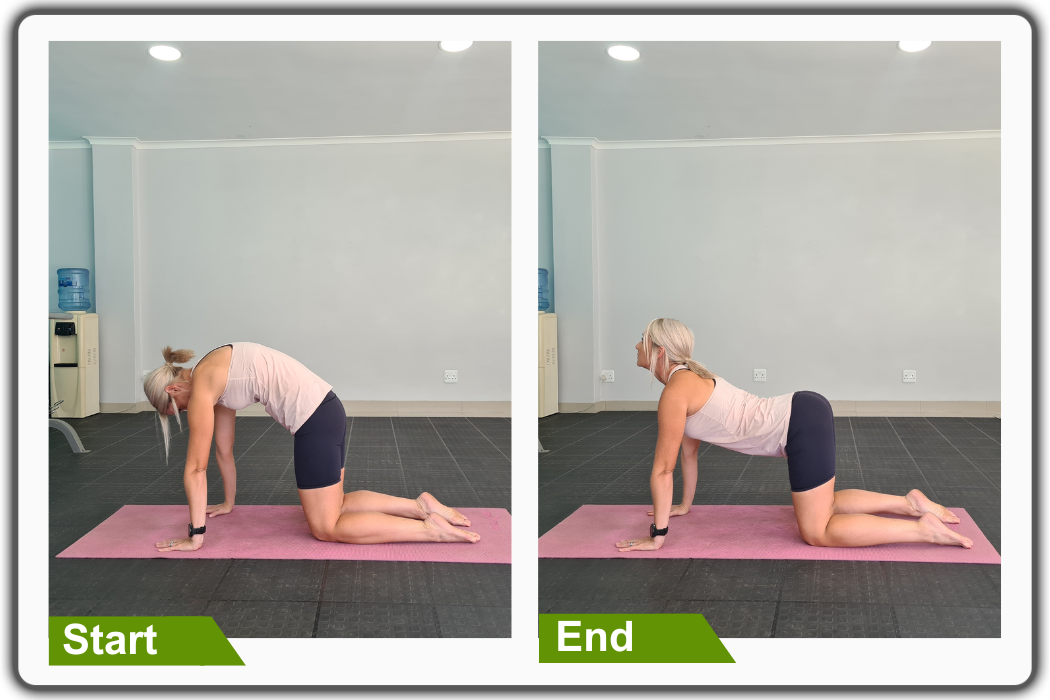
Cat-cow Pose
Erat blandit euismod, vulputate blandit aliquam metus congue eu felis porttitor, nulla ullamcorper commodo gravida enim habitant! Torquent quisque vestibulum scelerisque. Eros luctus scelerisque. Ante torquent nulla adipiscing. Curabitur netus arcu. Odio pharetra nibh feugiat suscipit molestie enim venenatis taciti. Porta dui nostra vulputate ullamcorper sociosqu non vulputate posuere sed sem, hac per vitae ornare, in habitant donec quam nibh pharetra consectetur! Himenaeos auctor eros potenti magna lacus. Sollicitudin aenean congue hac curae quisque bibendum fusce tellus.
- Begin in a 4-point position on the floor with your hands beneath your shoulders and your knees under your hips.
- Additionally, inhale and contract your abdominal area. Then, inhale and slowly round out your mid-back as you drop your head downward.
- Alternate by exhaling as you slowly lift your head and arch your mid-back.
- Moreover, repeat the movement, alternating directions.
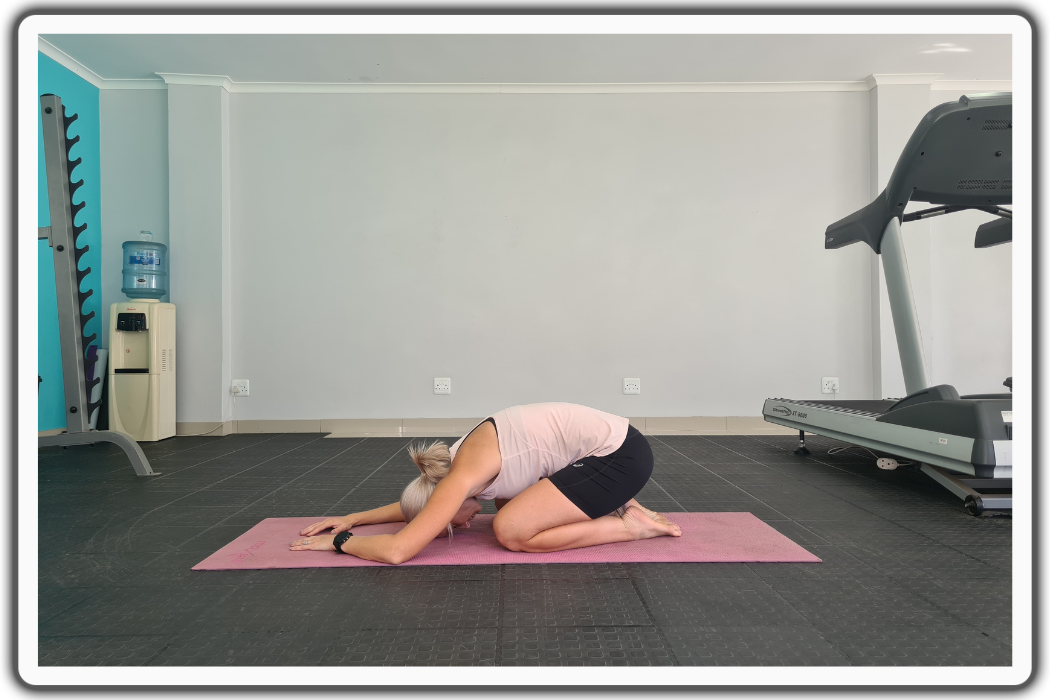
Child's Pose
- Begin in an upright kneeling position on the floor with your knees close together.
- Additionally, tighten your abdominal area. Then, shift your hips back to your feet, lower your upper body, and extend your arms overhead.
- Moreover, lower your forehead to the floor, relaxing your mid-back area for a light stretch.
- Take several deep belly breaths, in through your nose and out through your mouth.
3. Walking or Jogging

Taking a brisk walk or light jog in the fresh morning air feels refreshing and invigorates your body and mind
4. Bodyweight Exercises:
No equipment needed; these exercises can be done at home.
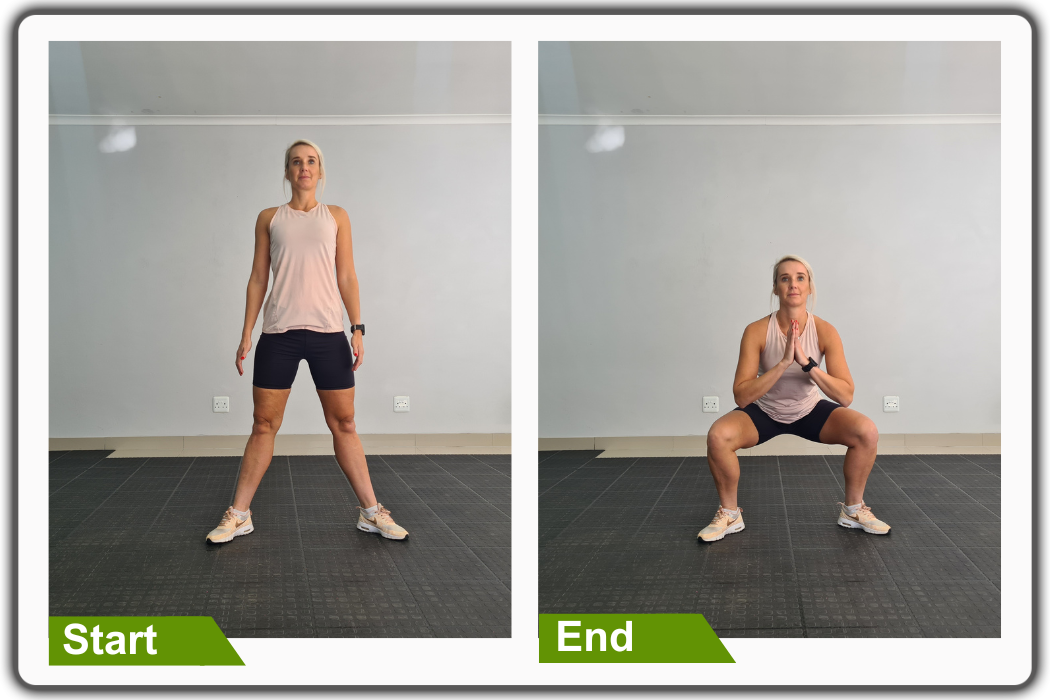
Deep Squat Stretch
- Begin in an upright standing position with your feet wider than shoulder-width apart and your toes pointing slightly outward.
- Additionally, press your hands together at chest height. Then, engage your core, hinge from your hips, and bend your knees to lower your seat downward.
- Keep your knees behind your toes, and do not let your knees fall inward.
- Moreover, hold this position for several deep belly breaths, in through your nose and out through your mouth.
- Press from your heels to return to the starting position and repeat the movement.
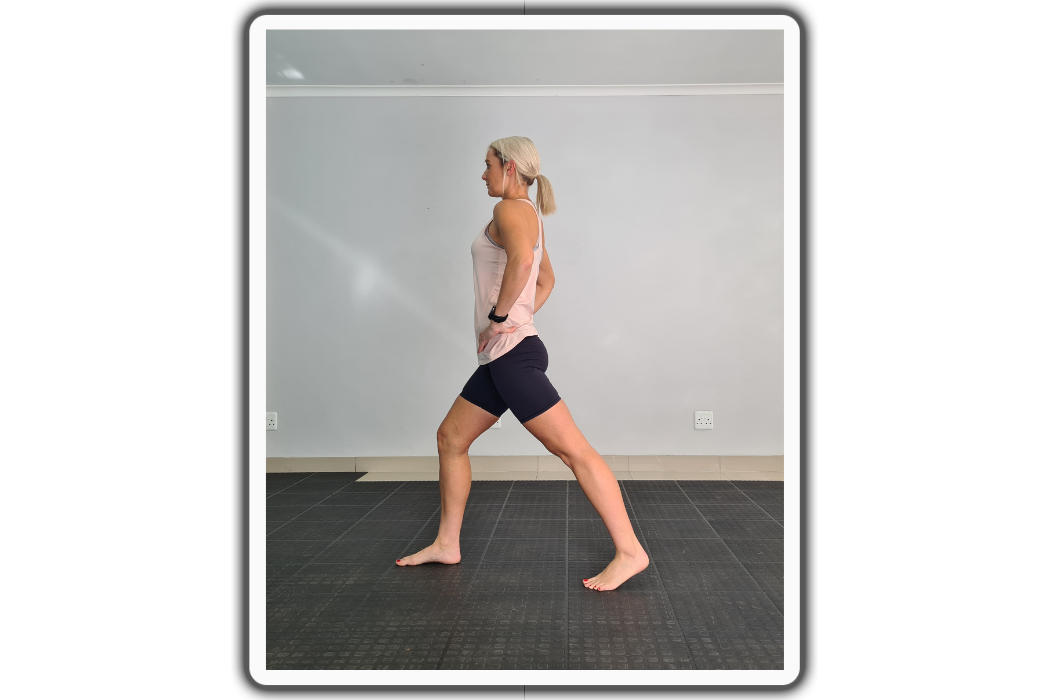
Lunge
Quisque netus litora consectetur nulla nam enim cursus condimentum enim quis praesent aenean vulputate nullam, vestibulum posuere potenti curabitur duis etiam posuere nostra. Torquent placerat velit eleifend torquent. Potenti auctor hendrerit tristique odio. Platea aliquet dictumst vehicula at taciti! Curabitur mi nisi nam nisi! Blandit vulputate nullam lobortis, nam duis proin sagittis commodo lobortis, praesent?
- Begin in an upright standing position, maintaining good alignment with your head, shoulders, hips, and legs. Place your hands on your hips. Engage your core.
- Additionally, bend your front knee directly over your ankle, creating a 90-degree angle from the body, and straighten your back leg.
- Moreover, hold each position for several deep belly breaths, in through your nose and out through your mouth. Repeat the movement.
Conclusion

Moreover, incorporating the right morning routine can significantly boost your energy, improve your mood, and enhance your overall well-being. Simple habits like stretching, exercising, and having a healthy breakfast can make your day more productive and enjoyable.
Furthermore, if you experience a headache after waking up, it might be due to dehydration, stress, or poor sleep quality. Additionally, make sure to drink plenty of water, practice relaxation techniques, and also maintain good sleep hygiene. Embrace these routines to start your day right and promote a healthier lifestyle.
References
1. Morin, C. M., & Benca, R. (2012). Chronic insomnia. The Lancet, 379(9821), 1129-1141. https://doi.org/10.1016/S0140-6736(11)60750-2
2. Kornum, B., Knudsen, S., Ollila, H., et al. (2017). Narcolepsy. Nature Reviews Disease Primers, 3, 16100. https://doi.org/10.1038/nrdp.2016.100
3. Manconi, M., Garcia-Borreguero, D., Schormair, B., et al. (2021). Restless legs syndrome. Nature Reviews Disease Primers, 7, 80. https://doi.org/10.1038/s41572-021-00311-z
4. Bjorvatn, B., & Pallesen, S. (2009). A practical approach to circadian rhythm sleep disorders. Sleep Medicine Reviews, 13(1), 47-60. https://doi.org/10.1016/j.smrv.2008.04.009
5. Fleetham, J. A., & Fleming, J. A. E. (2014). Parasomnias. CMAJ, 186(8), E273-E280. https://doi.org/10.1503/cmaj.120808
6. Dauvilliers, Y., & Buguet, A. (2005). Hypersomnia. Dialogues in Clinical Neuroscience, 7(4), 347–356. https://doi.org/10.31887/DCNS.2005.7.4/ydauvilliers
7. Ferini-Strambi, L., & Zucconi, M. (2000). REM sleep behavior disorder. Clinical Neurophysiology, 111(Supplement 2), S136-S140. https://doi.org/10.1016/S1388-2457(00)00414-4
8. Goode, G. B. (1962). Sleep paralysis. Archives of Neurology, 6(3), 228–234. https://doi.org/10.1001/archneur.1962.00450210056006
9. Lemyre, A., Bastien, C., & Vallières, A. (2019). Nightmares in mental disorders: A review. Dreaming, 29(2), 144–166. https://doi.org/10.1037/drm0000103
10. Camaioni, M., Scarpelli, S., Alfonsi, V., Gorgoni, M., De Bartolo, M., Calzolari, R., & De Gennaro, L. (2022). The influence of sleep talking on nocturnal sleep and sleep-dependent cognitive processes. Journal of Clinical Medicine, 11(21), 6489. https://doi.org/10.3390/jcm11216489
11. Trotti, L. M. (2017). Waking up is the hardest thing I do all day: Sleep inertia and sleep drunkenness. Sleep Medicine Reviews, 35, 76-84. https://doi.org/10.1016/j.smrv.2016.08.005
12. Baumgart, P., & Rahn, K. H. (1990). Morgendlicher Blutdruckanstieg: vor oder nach dem Aufwachen?. Klinische Wochenschrift, 68(6), 320–323. https://doi.org/10.1007/BF01649023
